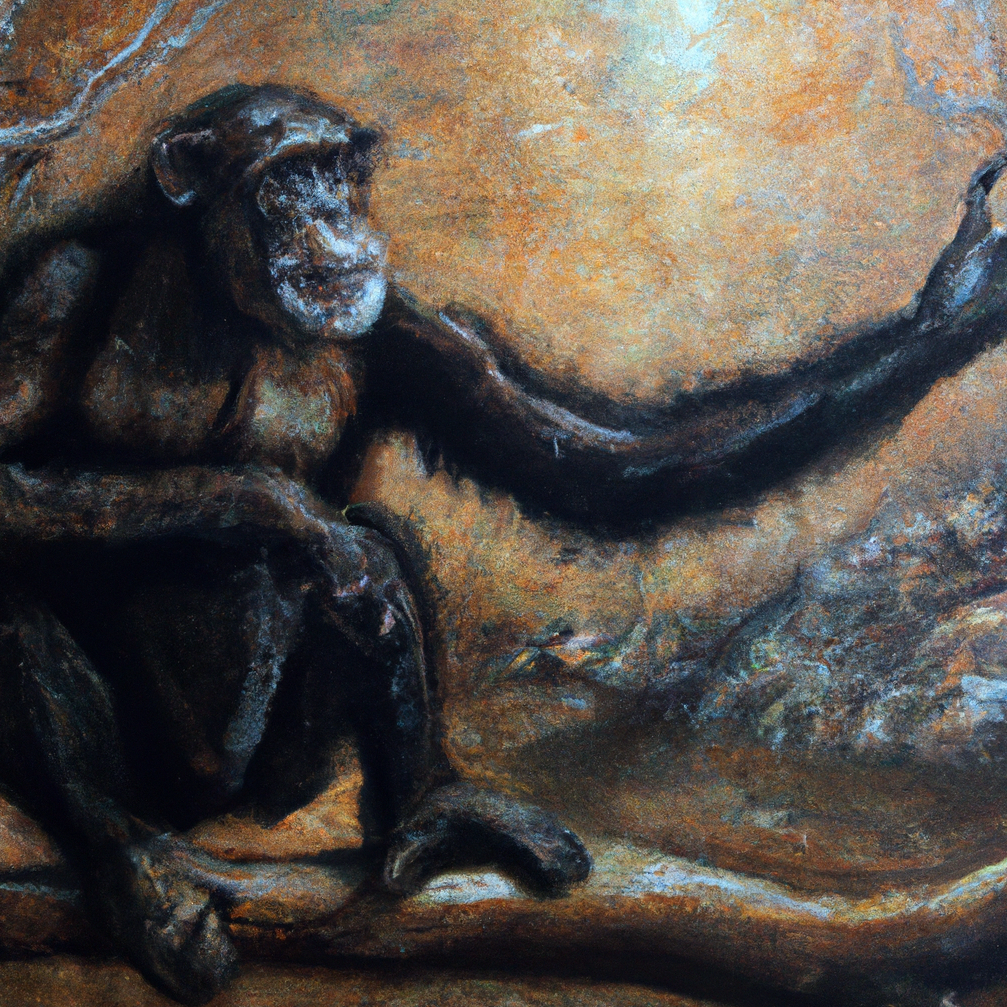Ape
Definition
Ape primarily refers to a large primate that lacks a tail, including the gorilla, chimpanzees, and gibbons. The term can also be used informally to describe someone who imitates or mimics another.
Parts of Speech
- Noun: ape
- Verb: to ape (meaning to mimic or imitate)
Pronunciation
- IPA Pronunciation
- American: /eɪp/
- British: /eɪp/
- Respelling
- American: ayp
- British: ayp
Etymology
The word "ape" originates from the Old English "apa", and is related to the Old High German "affo" and the Dutch "aap". The term has been used in English since before the 12th century.
Derivatives
- Ape-like
- Apish
- Apeman (or ape-man)
- Apehood
- Apedom
Synonyms
- Primate
- Simian
- Anthropoid
Antonyms
- Human (in the context of distinguishing between species)
- Original (when used in the context of mimicking)
- Unique
Usage
While "ape" is primarily used to describe certain tailless primates, it has also been historically utilized to describe individuals who closely imitate others, whether in behavior, style, or mannerisms.
Related Terms
- Hominid
- Gorilla
- Chimpanzee
- Gibbon
- Orangutan
Detailed Definition
As a Noun
- Primate Species: Any of various large tailless primates, including the gorilla, chimpanzee, orangutan, and gibbon.
- Example: The gorilla is the largest of the apes.
- Imitator: Informally, a person who closely imitates or mimics another, especially without originality.
- Example: The artist was dismissed as a mere ape of the great painters of the past.
As a Verb
- To Mimic or Imitate: To imitate or mimic, especially in a servile or unthinking manner.
- Example: He was known to ape the mannerisms of his superiors to gain favor.
Note: The term "ape" has evolved over time in English. While its primary and most common use relates to primates, its use to describe imitation is rooted in historical connotations where apes were believed to be imitative creatures.
ape



🇨🇳 Mandarin
- 猿 (yuán) - referring to the animal
- IPA: /jwæn˥˩/
- Respelling: ywahn
- 模仿 (mófǎng) - referring to imitating behavior
- IPA: /mo˥˧ faŋ˨˩˦/
- Respelling: moh-fahng
🇮🇳 Hindi
- वानर (vānar) - referring to the animal
- IPA: /ʋɑː.nər/
- Respelling: vaa-nar
- अनुकरण (anukaraṇ) - referring to imitating behavior
- IPA: /ə.nʊˈkə.rəɳ/
- Respelling: a-nu-ka-ran
🇪🇸 Spanish
- simio - referring to the animal
- IPA: /ˈsi.mjo/
- Respelling: see-myo
- imitar - referring to imitating behavior
- IPA: /i.miˈtaɾ/
- Respelling: ee-mee-tar
🇫🇷 French
- singe - referring to the animal
- IPA: /sɛ̃ʒ/
- Respelling: sahnzh
- imiter - referring to imitating behavior
- IPA: /i.mi.te/
- Respelling: ee-mee-tay
🇦🇪 Modern Standard Arabic
- قرد (qird) - referring to the animal
- IPA: /qird/
- Respelling: qird
- تقليد (taqlīd) - referring to imitating behavior
- IPA: /taqˈliːd/
- Respelling: taq-leed
🇧🇩 Bengali
- বানর (banor) - referring to the animal
- IPA: /banor/
- Respelling: banor
- অনুকরণ (anukaron) - referring to imitating behavior
- IPA: /ɔnukɔrɔn/
- Respelling: o-nu-ka-ron
🇷🇺 Russian
- обезьяна (obezyana) - referring to the animal
- IPA: /ɐ.bʲɪˈzʲja.nə/
- Respelling: a-byi-zhyah-na
- подражать (podrazhat') - referring to imitating behavior
- IPA: /pɐˈdraʐətʲ/
- Respelling: po-drazh-at
🇵🇹 Portuguese
- macaco - referring to the animal
- IPA: /mɐˈkaku/
- Respelling: ma-kah-koo
- imitar - referring to imitating behavior
- IPA: /imiˈtaɾ/
- Respelling: ee-mee-tar
🇮🇩 Indonesian
- kera - referring to the animal
- IPA: /ˈkɛ.ra/
- Respelling: ke-ra
- meniru - referring to imitating behavior
- IPA: /məˈniru/
- Respelling: me-nee-roo
🇩🇪 German
- Affe - referring to the animal
- IPA: /afə/
- Respelling: af-fuh
- nachahmen - referring to imitating behavior
- IPA: /ˈnaːxˌʔaːmən/
- Respelling: nahk-aah-men
🇯🇵 Japanese
- 猿 (saru) - referring to the animal
- IPA: /saɾu/
- Respelling: sah-roo
- 真似る (maneru) - referring to imitating behavior
- IPA: /ma.ne.ɾu/
- Respelling: mah-ne-roo
🇻🇳 Vietnamese
- khỉ - referring to the animal
- IPA: /khi˧˩/
- Respelling: khee
- bắt chước - referring to imitating behavior
- IPA: /ɓə˨˩t ʈwok˨˩˥/
- Respelling: bat chuok
🇰🇷 Korean
- 원숭이 (wonsungi) - referring to the animal
- IPA: /wʌn.suːŋ.i/
- Respelling: won-soong-ee
- 모방하다 (mobanghada) - referring to imitating behavior
- IPA: /mo.baŋ.ha.da/
- Respelling: mo-bang-ha-da
🇹🇷 Turkish
- maymun - referring to the animal
- IPA: /majˈmun/
- Respelling: may-moon
- taklit etmek - referring to imitating behavior
- IPA: /ˈtak.lit ˈet.mek/
- Respelling: tak-lit et-mek
🇵🇰 Urdu
- بندر (bandar) - referring to the animal
- IPA: /bʌn.dər/
- Respelling: bun-dar
- نقل کرنا (naql karna) - referring to imitating behavior
- IPA: /naql kəɾ.na/
- Respelling: naql kar-na





